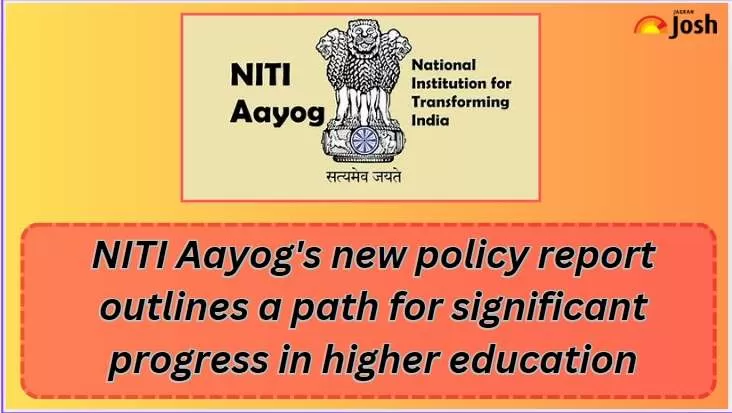A transformative policy report titled Expanding Quality Higher Education through States and State Public Universities was published on Monday, delivering a thorough analysis of the challenges and opportunities facing India's higher education system.
Also Check: IIIT Vadodara Joins Forces with TeamLease EdTech to Introduce Online BSc Programs
The report was introduced by Suman Bery, Vice Chairman of NITI Aayog, BVR Subrahmanyam, CEO of NITI Aayog, and several other officials.
The report provides an in-depth analysis of the decade-long transformation in higher education across states and state public universities (SPUs). It highlights the objectives set forth in the National Education Policy (NEP) 2020 and offers a series of policy recommendations designed to enhance the quality of education, funding, governance, and employability within these institutions.
At the report's launch, NITI Aayog Vice Chairman Suman Bery emphasised the need for quality alongside expansion in higher education. He stated that the report highlights crucial areas for improving the quality, accessibility, and global competitiveness of India's State Public Universities.
This groundbreaking report is the first to quantitatively analyze the performance of State Public Universities (SPUs). It incorporates feedback from officials in 20 states and union territories, 50 Vice Chancellors, leading academics, and heads of State Higher Education Councils. The report offers over 80 policy recommendations spanning four key areas: Quality, Funding & Financing, Governance, and Employability. It also includes a detailed implementation roadmap with short, medium, and long-term action plans.
The key policy recommendations presented in the NITI Aayog report focus on the following important areas:
- Quality: The report emphasises the need to strengthen research capabilities and "enhance pedagogy" in SPUs. Key recommendations include establishing a National Research Policy, forming Centres of Excellence in SPU clusters to address local challenges, and fostering Humanities Research. The report also recommends establishing Multidisciplinary Education and Research Universities (MERUs) to address shortcomings in research and education. An official stated that for a stronger research environment in India, State Public Universities must evolve into centers of both education and innovation and entrepreneurship.
- Funding and Financing: The report stresses the importance of greater financial autonomy and improved infrastructure for State Public Universities. Key recommendations include setting up State-level Infrastructure Finance Agencies, advocating for tax exemptions for SPUs, and promoting CSR contributions to enhance infrastructure.The report also suggests reviewing utility rates for State Public Universities to lower their operating expenses.
- Governance: The report prioritises improving governance in State Public Universities (SPUs), proposing a State-level Higher Education Vision for 2047 and stronger state higher education councils, similar to the University Grants Commission (UGC). Additional reforms include granting greater autonomy to SPUs in administrative affairs and revamping the faculty recruitment process. "We must implement structural changes that give SPUs the freedom to innovate, while also ensuring transparency and accountability," say Aayog officials.
- Employability : The report highlights the importance of employability and recommends strengthening university-industry partnerships and increasing internship and apprenticeship opportunities to achieve this goal. It also highlights the importance of entrepreneurship and innovation programs to inspire students to become job creators rather than just job seekers.
NITI Aayog team members emphasise that employability must be a central focus, not an afterthought. They advocate for integrating industry-relevant curricula and prioritising holistic student development to equip graduates for future challenges.
The report also presents more than 125 Performance Success Indicators to assess the progress of these recommendations. These indicators will monitor the success of initiatives in areas such as quality, funding, governance, and employability, ensuring that states and SPUs are held accountable for their role in advancing quality higher education.
Also Check:
